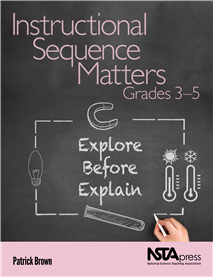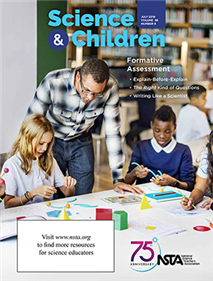All Three-Dimensional Learning resources
eBook
Instructional Sequence Matters, Grades 3–5: Explore Before Explain (e-book)
Instructional Sequence Matters, Grades 3–5 is a one-stop resource that will inspire you to reimagine how you teach science in elementary school. The book discusses two popular approaches for structuring your lessons: POE (Predict, Observe, and Expl...
Blog Post
Blog Post
Linking Science and Engineering Through Good Questions
Engineering design projects are a wonderful opportunity for students to develop science disciplinary core ideas (DCIs). (As many of you know, with the release of the NGSS, learning in engineering must be integrated with developing DCIs in physical, l...
By Greg Bartus
Journal Article
This column provides ideas and techniques to enhance your science teaching. ...
Blog Post
Three Strategies for Building Classroom Community
As I reflect on the end of this school year, I think about how successful I was in building a classroom community. A key aspect of transitioning my classroom to three-dimensional teaching and learning was discussion. Knowing this, I spent a...
By Nicole Vick
Blog Post
I first encountered the KLEWS teaching strategy in an article in Science and Children (NSTA 2015), “KLEWS to Explanation-Building in Science.” I shared the article and modeled the strategy with teachers who wanted to support their K–5 students ...
Blog Post
Impact of Change by Jessica Holman and Michelle Schuster
If you were to walk into our classroom years ago, you would see students from all walks of life, and with a range of ability levels. All of the students were blended together to learn science and were eager to be engaged. We were teaching units that ...
By Cindy Workosky
NSTA Press Book
Understanding Climate Change, Grades 7–12
Get help teaching one of the hottest topics in science with Understanding Climate Change, Grades 7–12. This nine-session module is written to be practical and accessible. It provides both extensive background and step-by-step instructions for using...
By Laura Tucker, Lois Sherwood
Blog Post
Elementary Science—Best Practices for All Students
Envision a room filled with noise, excited whispers, and students shouting across tables. Piles of tinfoil, plastic cups, scissors, string, and tape are scattered around the room. Paper, pencils, and notebooks filled with sketches are strewn across g...
By Cindy Workosky




